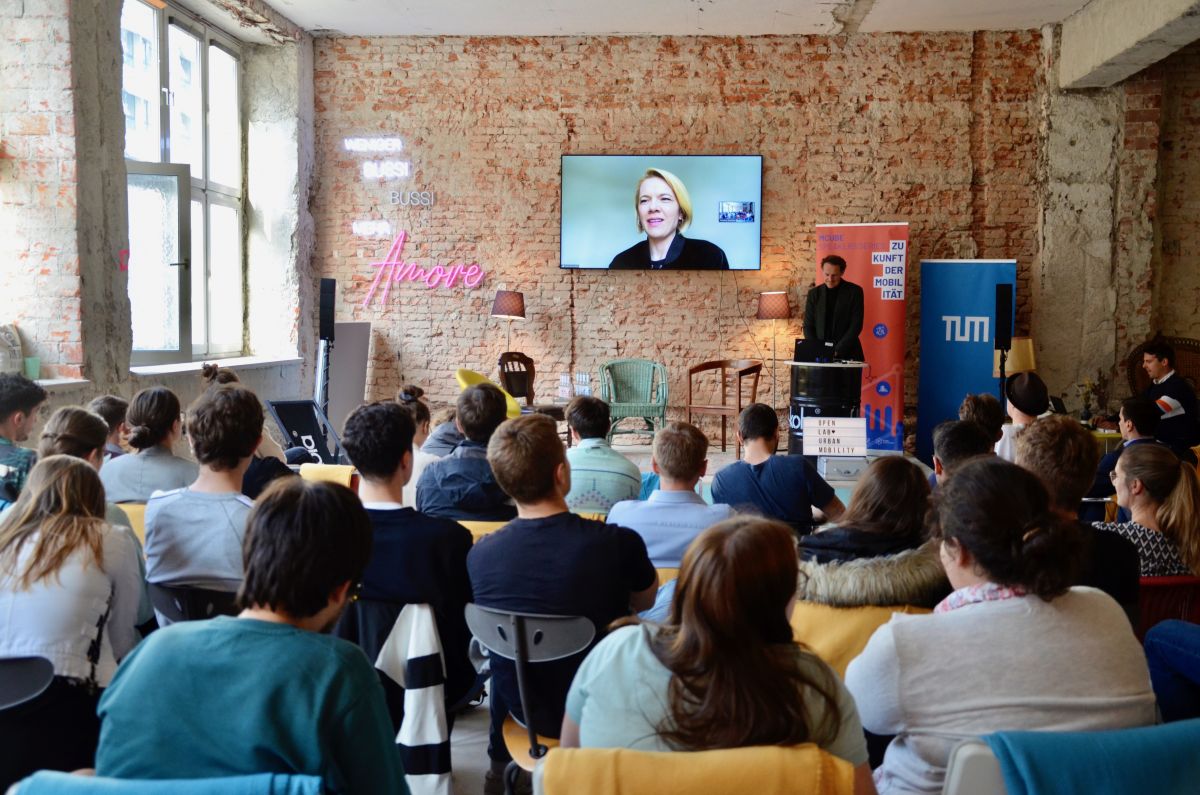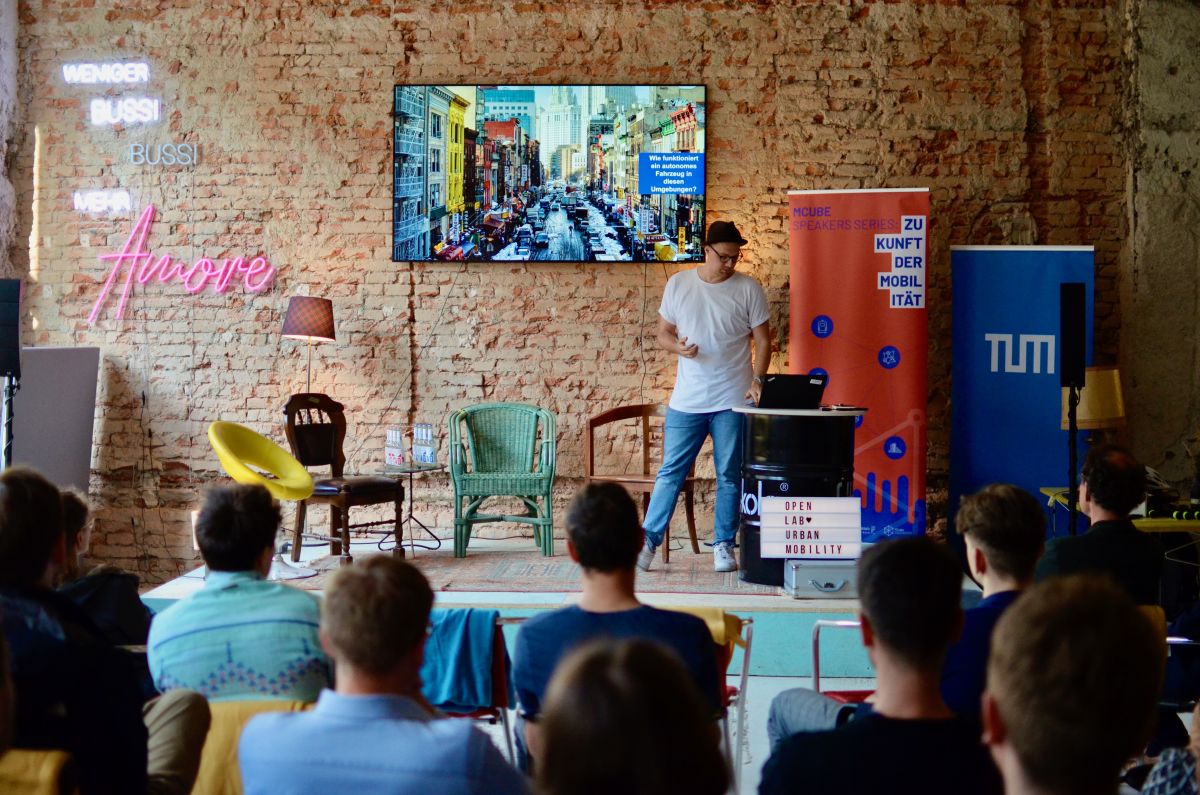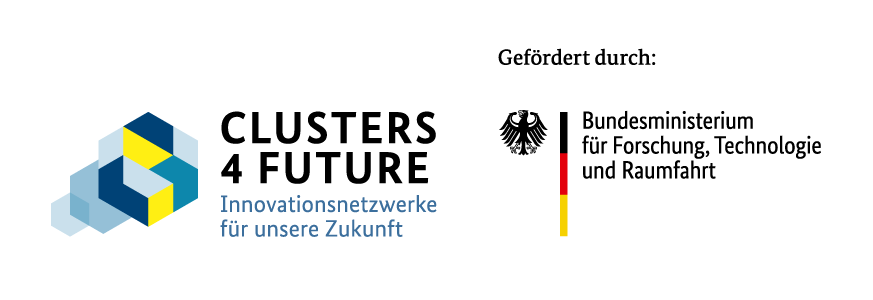How radical will AIArtificial intelligence (AI) refers to technologies that enable machines to perform tasks that require human intelligence - such as learning, problem solving or understanding language. In mobility, AI is used in route optimization, autonomous driving and intelligent traffic control systems to make mobility more efficient, safer and more sustainable. change all our lives, our cities and our mobility?
On May 25, 2023, we addressed precisely these questions together with experts. With impulses from the urban, practical and scientific perspective, ideas and visions for the role of artificial intelligence within the urban context for the near future were discussed.
AI technologies offer immense opportunities for our society and working world, especially in the area of urban mobility. Our cities are becoming ever more densely populated and the demands on transport systems are increasing. The integration of AIArtificial intelligence (AI) refers to technologies that enable machines to perform tasks that require human intelligence - such as learning, problem solving or understanding language. In mobility, AI is used in route optimization, autonomous driving and intelligent traffic control systems to make mobility more efficient, safer and more sustainable. enables more efficient traffic planning and control. By analyzing real-time data, traffic flows can be optimized and congestion reduced. AIArtificial intelligence (AI) refers to technologies that enable machines to perform tasks that require human intelligence - such as learning, problem solving or understanding language. In mobility, AI is used in route optimization, autonomous driving and intelligent traffic control systems to make mobility more efficient, safer and more sustainable. the possibility of integrating autonomous vehicles into traffic.
But how can we ensure that AIArtificial intelligence (AI) refers to technologies that enable machines to perform tasks that require human intelligence - such as learning, problem solving or understanding language. In mobility, AI is used in route optimization, autonomous driving and intelligent traffic control systems to make mobility more efficient, safer and more sustainable. is used responsibly and ethically? And what effects does the integration of AIArtificial intelligence (AI) refers to technologies that enable machines to perform tasks that require human intelligence - such as learning, problem solving or understanding language. In mobility, AI is used in route optimization, autonomous driving and intelligent traffic control systems to make mobility more efficient, safer and more sustainable. on our society and how can we prepare for them?
Our first speaker Dr. Laura Dornheim IT Officer and Chief Digital Officer (CDO) of the City of Munich, gave a video insight into the AIArtificial intelligence (AI) refers to technologies that enable machines to perform tasks that require human intelligence - such as learning, problem solving or understanding language. In mobility, AI is used in route optimization, autonomous driving and intelligent traffic control systems to make mobility more efficient, safer and more sustainable. in the administration. She emphasized that AIArtificial intelligence (AI) refers to technologies that enable machines to perform tasks that require human intelligence - such as learning, problem solving or understanding language. In mobility, AI is used in route optimization, autonomous driving and intelligent traffic control systems to make mobility more efficient, safer and more sustainable. has a prominent future within the administration of the City of Munich and gave examples of what this could look like: In the near future, citizens should be able to communicate with administrations in "natural language" instead of "official German".

The much-discussed topic of digitalization also found its place in this speaker series and was discussed in the context of improving urban planning. For example AIArtificial intelligence (AI) refers to technologies that enable machines to perform tasks that require human intelligence - such as learning, problem solving or understanding language. In mobility, AI is used in route optimization, autonomous driving and intelligent traffic control systems to make mobility more efficient, safer and more sustainable. in aerial image analysis or for filling traffic data gaps.
"City of Munich should be digitally sovereign."
Dr. Laura Dornheim

Prof. Dr. Johannes Betz and Prof. Dr. Jochen Hartmann from the Technical University of Munich reported on AI-supported mobility systems and smart cities in their respective presentations. Prof. Dr. Betz works and researches in the field of autonomous vehicle systems and gave an insight into the progress of AIArtificial intelligence (AI) refers to technologies that enable machines to perform tasks that require human intelligence - such as learning, problem solving or understanding language. In mobility, AI is used in route optimization, autonomous driving and intelligent traffic control systems to make mobility more efficient, safer and more sustainable. in autonomous driving. In addition, Prof. Dr. Hartmann works and researches in the field of digital marketing and shows how AIArtificial intelligence (AI) refers to technologies that enable machines to perform tasks that require human intelligence - such as learning, problem solving or understanding language. In mobility, AI is used in route optimization, autonomous driving and intelligent traffic control systems to make mobility more efficient, safer and more sustainable. this topic area now and in the future. Furthermore, digital marketing with AI influence was analyzed using the MCube project Wies'n Shuttle illustrated. Chatbots such as ChatGPT and OpenAI will play an increasingly important role in our lives and mobility in the city.
"We are much closer to autonomous driving in an urban context than many people think."
Prof. Dr. Johannes Betz
The last speaker was Tobias GlaßStrategy Manager for Connected and Autonomous Mobility at Stadtwerke München, explained in his presentation how Stadtwerke and MVG AIArtificial intelligence (AI) refers to technologies that enable machines to perform tasks that require human intelligence - such as learning, problem solving or understanding language. In mobility, AI is used in route optimization, autonomous driving and intelligent traffic control systems to make mobility more efficient, safer and more sustainable. want to integrate into future projects.
"Autonomous driving enables safe and efficient road use."
Tobias Glaß
About our speakers:
Many thanks for the impulses and discussions. A special thank you to Munich's innovative bridge builder Munich Innovation Crew & MUCBOOK Magazine for their hospitality.
"The future of mobility" is a series of lectures organized by MCube - Munich Cluster for the future of Mobility in Metropolitan Regions Technical University of Munich, openLAB Urban Mobility.
Together - Make it possible
Where to put cars, bicycles and e-scooters - and how do we organize parking space fairly, efficiently and sustainably?
How can mobility data and simulations make cities more liveable - and make change visible and tangible?
The MCube Consulting study shows how the Olympic Games could have a sustainable impact on Munich in terms of sport, society and the environment - something that has already been picked up on by many media outlets.
Munich is considering an Olympic bid - our study shows what opportunities and challenges the Games could bring for the economy, environment and society.
How do we want to move tomorrow? This question was the focus of the Citizens Lab at Marienplatz for six days.
The visual utopian Jan Kamensky presented his latest vision in cooperation with the Munich S-Bahn.
Carolin Zimmer from the Chair of Settlement Structure and Transport Planning and Sebastian Preiß from the Hans Sauer Foundation explain in an interview what the project has achieved and what makes it special.
Major award for a strong team: MCube Consulting receives the Innovation Award of the City of Munich - for a solution that reduces administrative workload, improves security and shows how research enables real change.
If Munich bids for the Olympics again, it will not do so arbitrarily - but with vision, attitude and a clear plan.
MCube had its own stand at the trade fair and brought together over 100 mobility pioneers at the "Bridging City Innovation Ecosystems" event above the rooftops of Barcelona.
No results available

What is MOSAIQ?
Imagine something: There is more space for people. The streets have more trees and plants. Everyone can get around better. That's how your Schwabing-West district could be in the future. How would you like your district to be? We want to talk to you about it!
The project is called MOSAIQ. MOSAIQ is a research∙project. MOSAIQ means: Mobility and urban climate in the future city∙part. The Technical University of Munich is leading the project.
What is MOSAIQ about?
MOSAIQ wants to make the streets in the city∙part more beautiful. People should feel comfortable there. There should be more space. For meetings and plants, for example. You can help decide what is tried out in the Stadt∙teil. The ideas come from you. Some ideas will be tried out on the streets for a certain period of time.
The aim of MOSAIQ is to make urban districts good places to live.
At the same time, the climate in the city should improve. And people should be able to move around the city easily.
What is happening in the district?